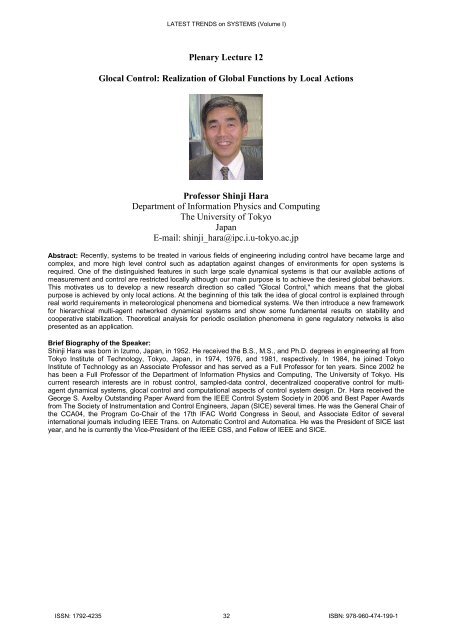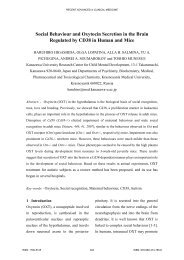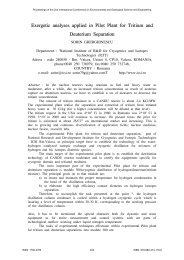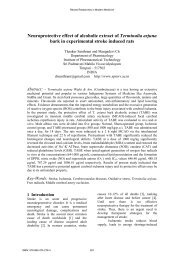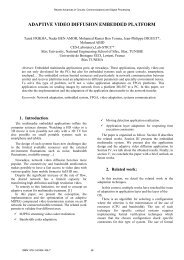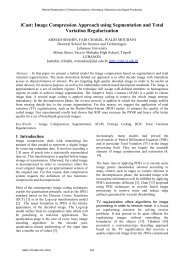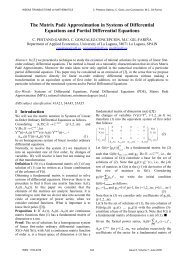LATEST TRENDS <strong>on</strong> SYSTEMS (Volume I)Plenary Lecture 11Logarithmic Number SystemsProfessor Mark ArnoldLehigh UniversityBethlehem, PAUSAE-mail: maab@lehigh.eduAbstract: The Logarithmic Number System (LNS) represents real numbers <strong>us</strong>ing a finite precisi<strong>on</strong> logarithm. Likeany finite representati<strong>on</strong>, the number of bits chosen determines the resoluti<strong>on</strong> of the system and therefore theapplicati<strong>on</strong> performance. LNS offers better performance and lower cost for "easy" real operati<strong>on</strong>s such asmultiplicati<strong>on</strong>, divisi<strong>on</strong>, roots and powers compared to fixed- and floating-point number <strong>systems</strong> where suchoperati<strong>on</strong>s are thought to be hard. The problems with LNS are that additi<strong>on</strong> and especially subtracti<strong>on</strong> areincreasingly expensive when performed with extreme accuracy, beca<strong>us</strong>e these operati<strong>on</strong>s involve table lookup andpossibly interpolati<strong>on</strong>. Also, c<strong>on</strong>versi<strong>on</strong> to and from c<strong>on</strong>venti<strong>on</strong>al representati<strong>on</strong>s can be similarly expensive. Anotherinc<strong>on</strong>venience is the fact the logarithm of zero is undefined. This talk will c<strong>on</strong>sider how certain special-purposeapplicati<strong>on</strong>s have overcome these problems to exploit LNS advantages, giving hardware that is faster, cheaper andc<strong>on</strong>sumes less power than those based <strong>on</strong> traditi<strong>on</strong>al arithmetic.Examples of special-purpose <strong>systems</strong> that have adopted LNS successfully include neural networks, multimediaencoders/decoders, c<strong>on</strong>trol <strong>systems</strong>, speech recogniti<strong>on</strong> and N-body simulators. In each of these applicati<strong>on</strong>s,designers have reformulated the algorithm to avoid certain LNS weaknesses. LNS works for such applicati<strong>on</strong>sbeca<strong>us</strong>e they have a large share of "easy" operati<strong>on</strong>s and they tolerate lower-precisi<strong>on</strong> results. Traditi<strong>on</strong>ally, LNSsum and difference calculati<strong>on</strong> have carried out with enough accuracy to be faithful to the number of bits of precisi<strong>on</strong>required for the applicati<strong>on</strong>, however this can be relaxed in some cases. To minimize the cost of the LNS, simulativestudies determine the minimum number of bits for in the LNS representati<strong>on</strong> for the applicati<strong>on</strong> to operatesuccessfully.This talk will explore many LNS techniques. These include interpolati<strong>on</strong> methods, cotransformati<strong>on</strong> of difficultsubtracti<strong>on</strong>s into easier additi<strong>on</strong>s, eliminati<strong>on</strong> of subtracti<strong>on</strong>s through redundancy, bit-serial arithmetic and ROM-lessapproximati<strong>on</strong>s. Also, this talk will c<strong>on</strong>sider recent implementati<strong>on</strong>s that generalize LNS, such as for complex values.Brief Biography of the Speaker:Mark G. Arnold received the BS and MS from the University of Wyoming (USA), and the PhD from the University ofManchester (UK) Institute of Science and Technology (UMIST). From 1982 to 2000, he was <strong>on</strong> the faculty of theUniversity of Wyoming. From 2000 to 2002, he was a lecturer at UMIST. In 2002, he joined the faculty of LehighUniversity (USA). In 1976, he co-developed SCELBAL, the first open-source floating-point high-level language forpers<strong>on</strong>al computers. In 1997, he received the best paper award from Open Verilog Internati<strong>on</strong>al for describing theVerilog Implicit To One-hot (VITO) tool he co-developed. In 2007, he received the best paper award from theApplicati<strong>on</strong>-specific Systems, Architectures and Processors (ASAP) c<strong>on</strong>ference for a paper describing novelcotransformati<strong>on</strong>s for Logarithmic Number Systems (LNS). He is the author of over <strong>on</strong>e hundred technical papers(the majority <strong>on</strong> LNS) and the book Verilog Digital Computer Design. His research interests include computerarithmetic, hardware descripti<strong>on</strong> languages, microrobotics and embedded, c<strong>on</strong>trol, multimedia and applicati<strong>on</strong>specific<strong>systems</strong>.ISSN: 1792-4235 31 ISBN: 978-960-474-199-1
LATEST TRENDS <strong>on</strong> SYSTEMS (Volume I)Plenary Lecture 12Glocal C<strong>on</strong>trol: Realizati<strong>on</strong> of Global Functi<strong>on</strong>s by Local Acti<strong>on</strong>sProfessor Shinji HaraDepartment of Informati<strong>on</strong> Physics and ComputingThe University of TokyoJapanE-mail: shinji_hara@ipc.i.u-tokyo.ac.jpAbstract: Recently, <strong>systems</strong> to be treated in vario<strong>us</strong> fields of engineering including c<strong>on</strong>trol have became large andcomplex, and more high level c<strong>on</strong>trol such as adaptati<strong>on</strong> against changes of envir<strong>on</strong>ments for open <strong>systems</strong> isrequired. One of the distinguished features in such large scale dynamical <strong>systems</strong> is that our available acti<strong>on</strong>s ofmeasurement and c<strong>on</strong>trol are restricted locally although our main purpose is to achieve the desired global behaviors.This motivates <strong>us</strong> to develop a new research directi<strong>on</strong> so called "Glocal C<strong>on</strong>trol," which means that the globalpurpose is achieved by <strong>on</strong>ly local acti<strong>on</strong>s. At the beginning of this talk the idea of glocal c<strong>on</strong>trol is explained throughreal world requirements in meteorological phenomena and biomedical <strong>systems</strong>. We then introduce a new frameworkfor hierarchical multi-agent networked dynamical <strong>systems</strong> and show some fundamental results <strong>on</strong> stability andcooperative stabilizati<strong>on</strong>. Theoretical analysis for periodic oscilati<strong>on</strong> phenomena in gene regulatory netwoks is alsopresented as an applicati<strong>on</strong>.Brief Biography of the Speaker:Shinji Hara was born in Izumo, Japan, in 1952. He received the B.S., M.S., and Ph.D. degrees in engineering all fromTokyo Institute of Technology, Tokyo, Japan, in 1974, 1976, and 1981, respectively. In 1984, he joined TokyoInstitute of Technology as an Associate Professor and has served as a Full Professor for ten years. Since 2002 hehas been a Full Professor of the Department of Informati<strong>on</strong> Physics and Computing, The University of Tokyo. Hiscurrent research interests are in rob<strong>us</strong>t c<strong>on</strong>trol, sampled-data c<strong>on</strong>trol, decentralized cooperative c<strong>on</strong>trol for multiagentdynamical <strong>systems</strong>, glocal c<strong>on</strong>trol and computati<strong>on</strong>al aspects of c<strong>on</strong>trol system design. Dr. Hara received theGeorge S. Axelby Outstanding Paper Award from the IEEE C<strong>on</strong>trol System Society in 2006 and Best Paper Awardsfrom The Society of Instrumentati<strong>on</strong> and C<strong>on</strong>trol Engineers, Japan (SICE) several times. He was the General Chair ofthe CCA04, the Program Co-Chair of the 17th IFAC World C<strong>on</strong>gress in Seoul, and Associate Editor of severalinternati<strong>on</strong>al journals including IEEE Trans. <strong>on</strong> Automatic C<strong>on</strong>trol and Automatica. He was the President of SICE lastyear, and he is currently the Vice-President of the IEEE CSS, and Fellow of IEEE and SICE.ISSN: 1792-4235 32 ISBN: 978-960-474-199-1


